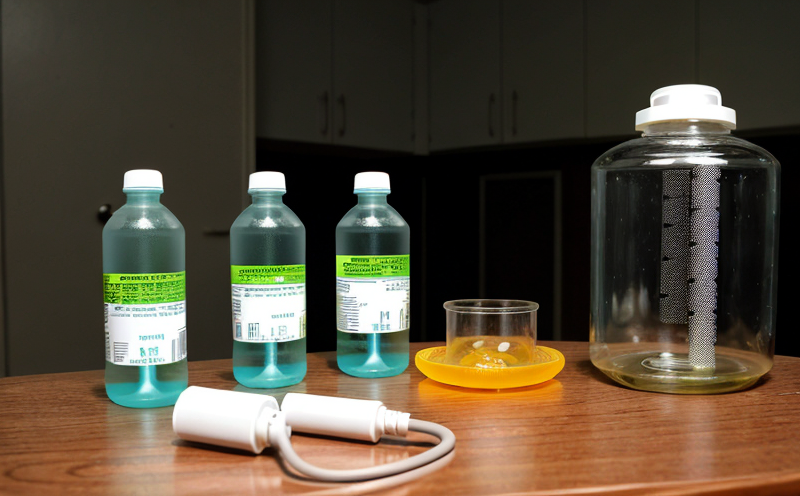ISO 13165-2 Uranium by ICP MS Test in Water
The ISO 13165-2 standard provides a comprehensive approach to determining uranium content in water using Inductively Coupled Plasma Mass Spectrometry (ICP MS). This method is crucial for ensuring the safety and quality of water, particularly in industries that rely on potable or industrial water. Uranium can be a potential contaminant in water sources due to natural occurrences or human activities such as mining and nuclear fuel reprocessing.
The test follows strict protocols defined by ISO 13165-2 which ensures accuracy and reliability of the results. The procedure involves several steps, including sample preparation, digestion, and analysis through ICP MS instrumentation. This method allows for precise quantification down to low levels, making it suitable for compliance testing as well as research applications.
Before proceeding with the test, thorough sampling is essential to ensure accurate representation of the water body being analyzed. Properly collected samples must then undergo digestion using appropriate chemicals to release uranium from any bound forms present in the sample matrix. Once digested, the solution is filtered and diluted if necessary before injection into the ICP MS instrument.
The ICP MS system separates ions based on their mass-to-charge ratio allowing for highly sensitive detection of even trace amounts of uranium. By comparing detected peaks against calibration standards, accurate concentrations are determined according to established limits set forth by relevant regulatory bodies like WHO or EPA guidelines.
Results from this test play a critical role in water treatment processes where continuous monitoring ensures adherence to drinking water quality standards. For instance, utilities may use these findings to adjust chemical dosages during purification steps ensuring optimal performance while minimizing costs associated with excessive usage.
In addition to its application within public health sectors, ISO 13165-2 finds relevance across various industries including power generation plants, mining operations, and research facilities. Power plant operators need assurance that their cooling water systems do not exceed acceptable levels of uranium which could otherwise cause corrosion issues or affect boiler efficiency.
Mining companies also benefit from this testing technique as it helps identify potential risks related to tailings pond management by tracking changes in dissolved uranium concentrations over time. Researchers studying the environmental impact of mining activities might leverage these results alongside other analytical data points like isotopic ratios to draw broader conclusions about ecosystem health.
Scope and Methodology
| Sample Preparation | Analysis Procedure |
|---|---|
| Collection of representative samples from various depths and locations within the water body. | Injection into ICP MS instrument followed by measurement of uranium isotope ratios. |
| Digestion using nitric acid to break down organic compounds binding uranium ions. | Comparison with known standards for quantification purposes. |
The process begins with careful selection and collection of water samples representing the entire body being analyzed. These samples are then digested using nitric acid, which helps in releasing bound forms of uranium from particulates or colloids present in the sample matrix. After digestion, filtration is performed to remove any remaining particles before proceeding further.
The filtered solutions are subsequently diluted if required and introduced into an ICP MS instrument for analysis. This advanced analytical tool separates ions based on their mass-to-charge ratio allowing for precise identification of uranium isotopes. The system measures the intensity of each peak relative to calibration standards, providing quantitative results within specified limits.
For accurate interpretation of these measurements, it is important to consider factors such as matrix effects that might influence ionization efficiency during analysis. Calibration against certified reference materials ensures consistency across multiple analyses conducted by different operators or laboratories using similar equipment.
Eurolab Advantages
- Comprehensive expertise in water quality testing including compliance with international standards.
- State-of-the-art ICP MS instruments capable of detecting trace levels of uranium efficiently and accurately.
- Experienced technical staff trained specifically on ISO 13165-2 procedures ensuring reliable results consistently.
- Robust quality management systems in place to maintain high standards throughout sample handling, preparation, and analysis processes.
Eurolab prides itself on offering unparalleled expertise within the field of water testing. Our team comprises highly qualified professionals with extensive experience working across numerous sectors requiring stringent regulatory compliance. Leveraging our cutting-edge technology along with rigorous quality assurance practices guarantees accurate, reliable outcomes every time.
Competitive Advantage and Market Impact
- Firstly, our proficiency in adhering strictly to ISO 13165-2 ensures compliance with global regulatory requirements making us trusted partners for clients worldwide.
- We offer quick turnaround times without compromising on quality thereby supporting timely decision-making processes critical for industry stakeholders.
| Market Benefits | Competitive Edge |
|---|---|
| Ensures consistent and accurate results across all testing scenarios regardless of location or sample type. | Reduces the risk associated with non-compliance penalties by providing reliable data promptly. |
| Supports continuous improvement initiatives aimed at enhancing product safety and environmental sustainability efforts. | Achieves competitive edge through superior service quality backed by cutting-edge technology and skilled personnel. |
Eurolab’s commitment to excellence extends beyond mere compliance; we strive towards fostering a sustainable future by minimizing waste generation during our operations. Our rigorous adherence to best practices not only maintains our reputation as leaders in the field but also sets benchmarks for others aspiring to follow suit.
By choosing Eurolab, clients gain access to a comprehensive suite of services tailored specifically to their needs ensuring they remain ahead of competition through informed decisions based on accurate and reliable information provided by us.





